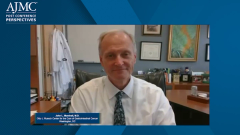
Botensilimab and Balstilimab in Refractory Microsatellite Stable (MSS) mCRC
An overview of data presented at ESMO GI 2023 on combined botensilimab and balstilimab therapy in heavily pretreated patients with microsatellite stable metastatic colorectal cancer.
Episodes in this series

John L. Marshall, MD: It’s phase 1, but everybody is talking about it. The idea is, can we get immunotherapies to work in what are thought of as cold tumors? These are microsatellite stable cancers and, in this case, colon cancer. We all want this kind of thing to work. If you give 1 immunotherapy—a checkpoint inhibitor, for example—that doesn’t do anything for those patients. There are other studies similar to the 1 we’re going to talk about where they tried to combine a couple of immunotherapies and saw some limited level of activity. But when we test it further, it’s been very difficult to demonstrate that it’s working. There are 2 medicines, botensilimab and balstilimab. One is a multifunctional CTLA4 drug; the other is a PD-1 drug. Putting them together in colon cancer in this clinical trial did demonstrate in some patients a deep and long-lasting response. This was an early signal that immediately hit Twitter, where folks were saying, “Maybe there’s something about this combination that is giving some—not many, but some—patients a nice response.” Those data were updated.
We continue to see updates from the patients on these clinical trials, tolerated the way you would expect of immunotherapy, where most patients have few adverse effects but a few have immunotherapy adverse effects. This was 101 patients with colon cancer that was refractory to prior therapies, with a median age in the 50s. Nowadays, there’s been this shift to younger colon cancers and different mutations—RAS, BRAF, etc. Tumor mutational burden was rare as a high problem for those patients because that would be another trigger for immunotherapies. It was a good patient population. Believe it or not, they had 1 CR [complete response] and 15 PRs [partial responses]. There were 101 patients, so that’s not a huge response rate, but the responses that were seen were pretty impressive. There are a high number of those responses, which are ongoing. A quick summary is that these dual-antibody approaches targeting 2 aspects of the immune checkpoint system were shown in this study to have some patients benefit fairly significantly, making us eager to look further in larger patient populations.
Transcript edited for clarity.
Newsletter
Stay ahead of policy, cost, and value—subscribe to AJMC for expert insights at the intersection of clinical care and health economics.









